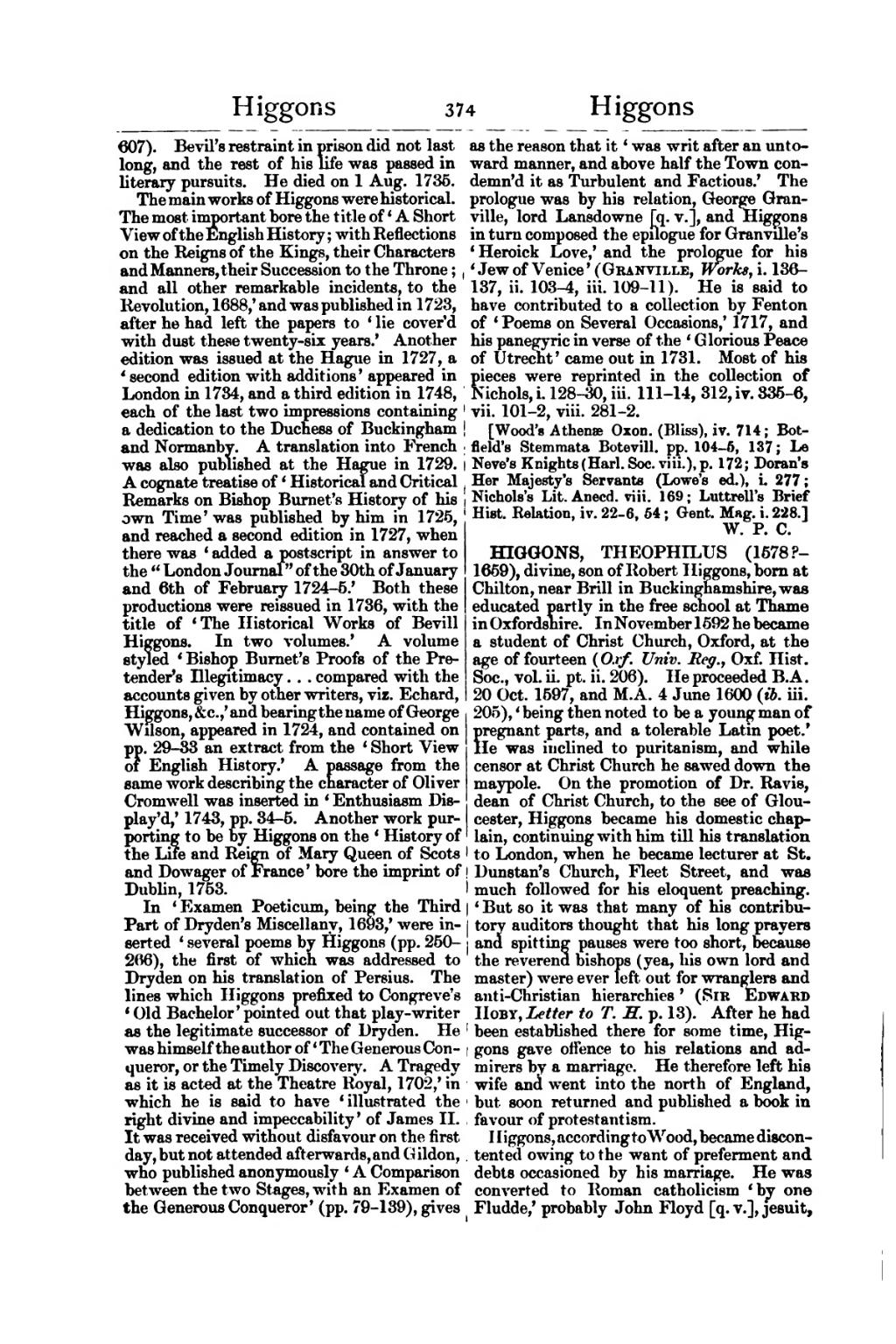607). Bevil's restraint in prison did not last long, and the rest of his life was passed in literary pursuits. He died on 1 Aug. 1735.
The main works of Higgons were historical. The most important bore the title of ‘A Short View of the English History; with Reflections on the Reigns of the Kings, their Characters and Manners, their Succession to the Throne; and all other remarkable incidents, to the Revolution, 1688,’ and was published in 1723, after he had left the papers to ‘lie cover'd with dust these twenty-six years.’ Another edition was issued at the Hague in 1727, a ‘second edition with additions’ appeared in London in 1734, and a third edition in 1748, each of the last two impressions containing a dedication to the Duchess of Buckingham and Normanby. A translation into French was also published at the Hague in 1729. A cognate treatise of ‘Historical and Critical Remarks on Bishop Burnet's History of his own Time’ was published by him in 1725, and reached a second edition in 1727, when there was ‘added a postscript in answer to the “London Journal” of the 30th of January and 6th of February 1724–5.’ Both these productions were reissued in 1736, with the title of ‘The Historical Works of Bevill Higgons. In two volumes.’ A volume styled ‘Bishop Burnet's Proofs of the Pretender's Illegitimacy … compared with the accounts given by other writers, viz. Echard, Higgons, &c.,’ and bearing the name of George Wilson, appeared in 1724, and contained on pp. 29–33 an extract from the ‘Short View of English History.’ A passage from the same work describing the character of Oliver Cromwell was inserted in ‘Enthusiasm Display'd,’ 1743, pp. 34–5. Another work purporting to be by Higgons on the ‘History of the Life and Reign of Mary Queen of Scots and Dowager of France’ bore the imprint of Dublin, 1753.
In ‘Examen Poeticum, being the Third Part of Dryden's Miscellany, 1693,’ were inserted ‘several poems by Higgons (pp. 250–266), the first of which was addressed to Dryden on his translation of Persius. The lines which Higgons prefixed to Congreve's ‘Old Bachelor’ pointed out that play-writer as the legitimate successor of Dryden. He was himself the author of ‘The Generous Conqueror, or the Timely Discovery. A Tragedy as it is acted at the Theatre Royal, 1702,’ in which he is said to have ‘illustrated the right divine and impeccability’ of James II. It was received without disfavour on the first day, but not attended afterwards, and Gildon, who published anonymously ‘A Comparison between the two Stages, with an Examen of the Generous Conqueror’ (pp. 79–139), gives as the reason that it ‘was writ after an untoward manner, and above half the Town condemn'd it as Turbulent and Factious.’ The prologue was by his relation, George Granville, lord Lansdowne [q. v.], and Higgons in turn composed the epilogue for Granville's ‘Heroick Love,’ and the prologue for his ‘Jew of Venice’ (Granville, Works, i. 136–137, ii. 103–4, iii. 109–11). He is said to have contributed to a collection by Fenton of ‘Poems on Several Occasions,’ 1717, and his panegyric in verse of the ‘Glorious Peace of Utrecht’ came out in 1731. Most of his pieces were reprinted in the collection of Nichols, i. 128–30, iii. 111–14, 312, iv. 335–6, vii. 101–2, viii. 281–2.
[Wood's Athenæ Oxon. (Bliss), iv. 714; Botfield's Stemmata Botevill. pp. 104–5, 137; Le Neve's Knights (Harl. Soc. viii.), p. 172; Doran's Her Majesty's Servants (Lowe's ed.), i. 277; Nichols's Lit. Anecd. viii. 169; Luttrell's Brief Hist. Relation, iv. 22–6, 54; Gent. Mag. i. 228.]
HIGGONS, THEOPHILUS (1578?–1659), divine, son of Robert Higgons, born at Chilton, near Brill in Buckinghamshire, was educated partly in the free school at Thame in Oxfordshire. In November 1592 he became a student of Christ Church, Oxford, at the age of fourteen (Oxf. Univ. Reg., Oxf. Hist. Soc., vol. ii. pt. ii. 206). He proceeded B.A. 20 Oct. 1597, and M.A. 4 June 1600 (ib. iii. 205), ‘being then noted to be a young man of pregnant parts, and a tolerable Latin poet.’ He was inclined to puritanism, and while censor at Christ Church he sawed down the maypole. On the promotion of Dr. Ravis, dean of Christ Church, to the see of Gloucester, Higgons became his domestic chaplain, continuing with him till his translation to London, when he became lecturer at St. Dunstan's Church, Fleet Street, and was much followed for his eloquent preaching. ‘But so it was that many of his contributory auditors thought that his long prayers and spitting pauses were too short, because the reverend bishops (yea, his own lord and master) were ever left out for wranglers and anti-Christian hierarchies’ (Sir Edward Hoby, Letter to T. H. p. 13). After he had been established there for some time, Higgons gave offence to his relations and admirers by a marriage. He therefore left his wife and went into the north of England, but soon returned and published a book in favour of protestantism.
Higgons, according to Wood, became discontented owing to the want of preferment and debts occasioned by his marriage. He was converted to Roman catholicism ‘by one Fludde,’ probably John Floyd [q. v.], jesuit,
